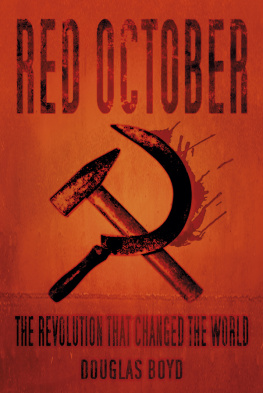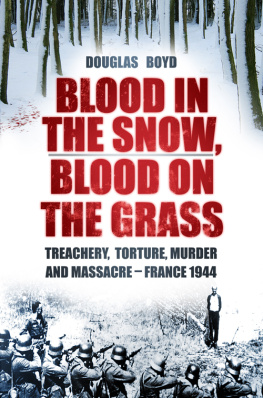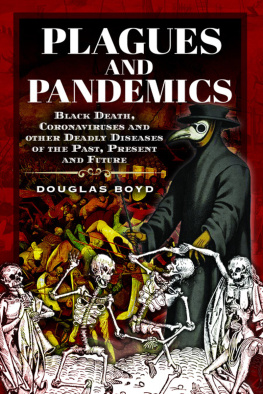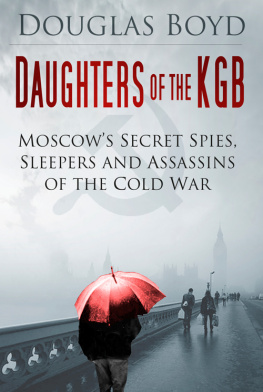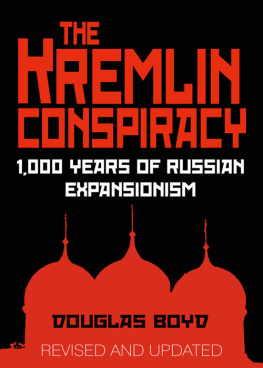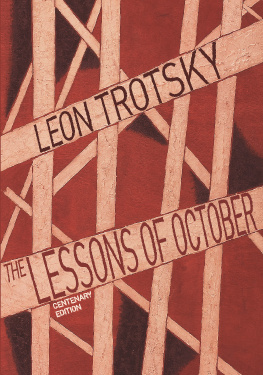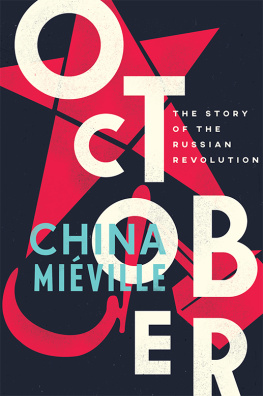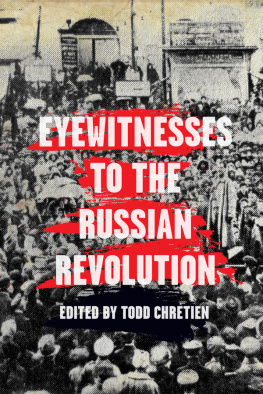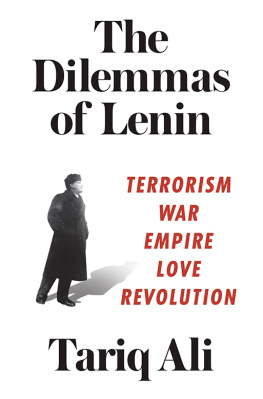RED OCTOBER

First published in 2017
The History Press
The Mill, Brimscombe Port
Stroud, Gloucestershire, GL5 2QG
www.thehistorypress.co.uk
This ebook edition first published in 2017
All rights reserved
Douglas Boyd, 2017
The right of Douglas Boyd to be identified as the Author of this work has been asserted in accordance with the Copyright, Designs and Patents Act 1988.
This ebook is copyright material and must not be copied, reproduced, transferred, distributed, leased, licensed or publicly performed or used in any way except as specifically permitted in writing by the publishers, as allowed under the terms and conditions under which it was purchased or as strictly permitted by applicable copyright law. Any unauthorised distribution or use of this text may be a direct infringement of the authors and publishers rights, and those responsible may be liable in law accordingly.
EPUB ISBN 978 0 7509 8508 6
Original typesetting by The History Press
eBook converted by Geethik Technologies
CONTENTS
LIST OF ABBREVIATIONS AND ACRONYMS
AOK | Armeeoberkomando (Austro-Hungarian Supreme Command in 191418 war) |
ARA | American Relief Administration |
BMO | Bolshevik Military Organisation |
Cheka | Chrezvechainaya komissiya (literally, the extraordinary commission the first Soviet security organisation) |
C-in-C | Commander-in-chief |
Comintern | Communist International |
CP | Central Powers |
CPGB | Communist Party of Great Britain |
CPSU | Communist Party of the Soviet Union |
FBI | Federal Bureau of Investigation (US) |
Gensek | Generalny Sekretar (General Secretary of the CPSU) |
GPU | Gosudarstvennoye Politicheskoye Upravleniye (Soviet security organisation 192223) |
HQ | headquarters |
KGB | Komitet Gosudarstvennoi Bezopasnosti (last Soviet state security organisation) |
LSR | Left Socialist Revolutionary (Party) |
NCO | non-comissioned officer |
NEP | Novy Ekonomicheski Politik (New Economic Policy) |
NKVD | Narodny Komitet Vnukhtrennikh Del (Soviet state security organisation 193446) |
NRZ | Neue Rheinische zeitung |
OGPU | Obyedinonnoye Gosudarstvennoye Polititicheskoye Upravleniye (Soviet state security organisation 192334 |
OHL | Oberste Heeresleitung (German Supreme Command in 191418 war) |
Okhrana | Otedleniye po Okhraneniyu Obshchestvennoi Bezopasnosti i Poryadki (Tsarist secret police) |
Orgburo | organisational office of the CPSU |
Politburo | governing body of CPSU Central Committee (literally policy office) |
POUM | Partit Obrer dUnificaci Marxista (Catalan Marxist Party in Spanish Civil War) |
POW | prisoner of war |
PR | public relations |
RSDLP | Russian Social Democratic Labour Party |
RSFSR | Russian Soviet Federative Socialist Republic |
SDLP | Social Democratic Labour Party |
SIGINT | signals interception |
Sovnarkom | Soviet Narodnikh Komissarov (Council of National Commissars) |
SR | Socialist Revolutionary (Party) |
Stavka | Stavka Verkhovnovo Glavnokomanduyushchevo (Russian Supreme Command 191418) |
Tseka | Tsentralny Komitet (Central Committee of CPSU) |
US/USA | United States of America |
USSR | Union of Soviet Socialist Republics (192291) |
AUTHORS NOTES
1. All translations by the author, unless otherwise attributed.
2. With the exception of the last Tsar, referred to throughout by the English form of his name as Nicholas to distinguish him from all other Russians called Nikolai, Russian first names are in their transliterated form of e.g. Yevgeni A. Tchaikovsky, with the middle initial standing for the patronymic.
3. Until February 1918 Russia used the Julian calendar, which by then was thirteen days behind the modern or Gregorian calendar introduced under Pope Gregory in 1582 and subsequently used elsewhere in Christian countries. This is why the October Revolution took place in November 1917. Dates here are according to the modern calendar, except where noted otherwise.
4. Russian being gender-sensitive, the wife of Mr Ranevsky is Mrs or Madame Ranevskaya, etc.
PART 1
1
IN THE BEGINNING WERE THE WORDS
Karl Marxs Manifest der Kommunistischen Partei was published in German in 1867 and subsequently translated into a number of other languages. Its English title was The Manifesto of the Communist Party. In the original, it beganEin Gespenst geht um in Europa a spectre is haunting Europe, the spectre of the communism. It continued with the assertion that all the governments in Europe were afraid of a virtually non-existent political party, ending with the exhortation, Proletarier aller Lnder, vereinigt Euch! which is commonly rendered in English as, Workers of the World, Unite! The manifesto did not include the formula Jeder nach seinen Fhigkeiten, jedem nach seinen Bedrfnissen From each according to his ability, to each according to his need. Outside of a few religious communities this utopian formula has never been known to work for very long. Marx quoted it in his 1875 Critique of the Gotha Programme, but it had previously been used by French socialist Louis Blanc in 1839, whose version of communist philosophy was named Blanquism. In less succinct form, it can be traced back as early as 1755 to express the ideal of communism, not its practice.
The year 1848, in which Marx began to write the Manifesto, was the Year of Revolution throughout Europe. It began in Sicily in January, followed by France in February and spread to more than fifty other countries in Europe and elsewhere. There were many factors in this coincidence, which included the dissatisfaction of the rapidly growing working class employed in the vast factories of the time and badly paid, fed and housed in slums of towns whose expansion was too rapid for a proper infrastructure of paved streets and sanitation. Their anger was often harnessed and given direction by middle-class educated leaders like Marx, himself raised in a prosperous German-Jewish family, and his collaborator Friedrich Engels, who came from a rich German Protestant background. Engels had contributed to the drafting of the manifesto, but was not credited as co-author or contributor on publication.
The March revolution of 1848 in the thirty-nine states of the German Confederation it was not a united country until 1871 was followed by an uprising in Denmark and Schleswig-Holstein at the end of the month. Further north in Sweden, the riots collectively called
Next page
